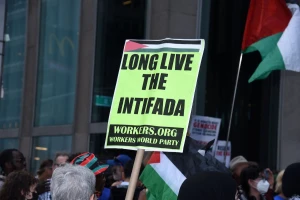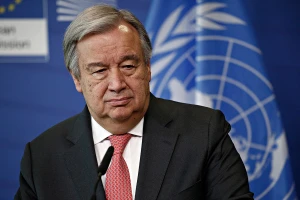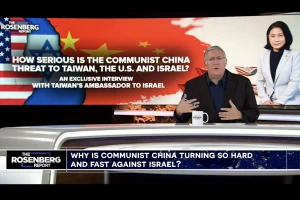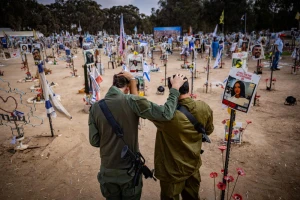Two years after October 7, memorials drown in a European sea of indifference
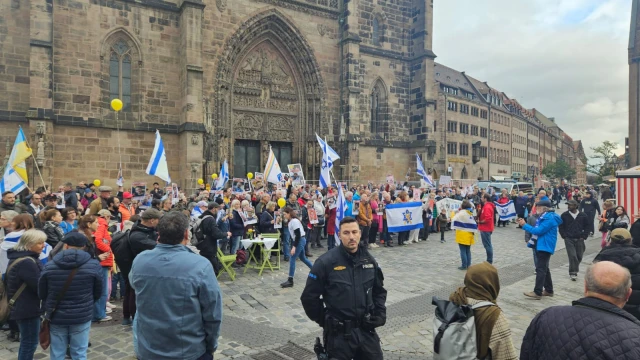
On a chilly autumn night in the southern German city of Nuremberg, some 150 people gathered to mark the second anniversary of the October 7 massacre that was committed by Hamas terrorists in Israel.
At one point, a middle-aged man, visibly belonging to Germany’s well-to-do bourgeoisie, hurried by the gathering, took a quick, skeptical look, without stopping, muttered something about “Apartheid” in a slightly disapproving tone before continuing on his way.
To me, this encapsulates the situation of solidarity with Israel in Germany and much of Europe.
The majority of people passing by this central node in the city’s pedestrian zone tried to ignore the mostly silent memorial, shooting confused glances at the Israeli flags before circling around the demonstration in a wide arc.
Most of the real supporters and friends Israel has left are elderly members of the local Jewish communities and Evangelical congregations, with a smattering of the few young, far-left activists who haven’t given in to most of the Left’s hatred of Israel.
Standing against them on that day in Nuremberg was a group that was, at first, very small.
But it quickly grew in size and volume while being progressively pushed farther away by a sizable police troop. This group was demonstrating against the Israeli “genocide,” using all the slogans that have become as commonplace in Europe over the past years as they are contemptible.
This group – except for one elderly Palestinian man who appeared to be a recent immigrant – was young, loud, mostly male, hostile, and overwhelmingly Arab.
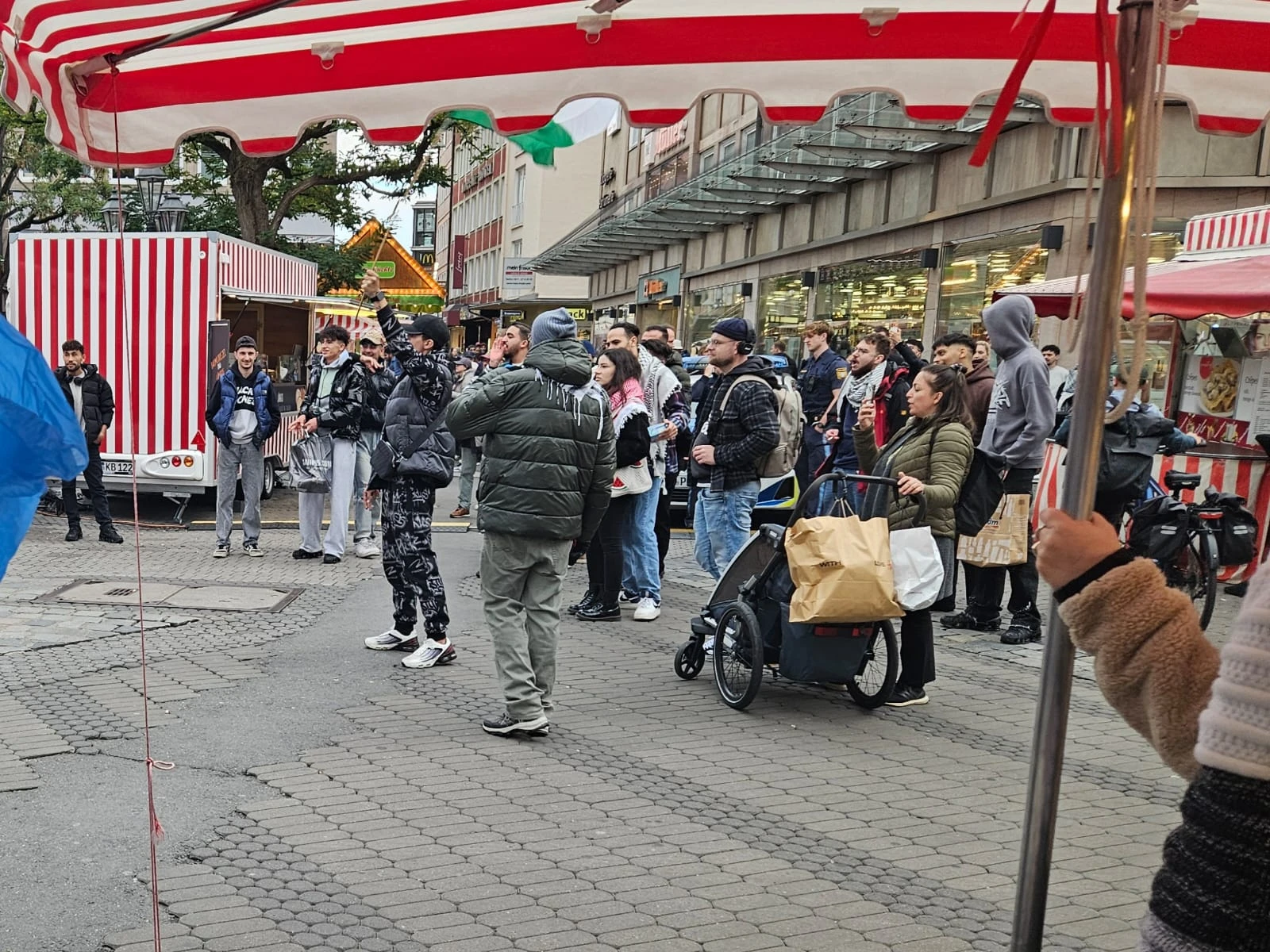
Speaking in Arabic, they exchanged information about which cities in the Middle East they had left behind.
What a strange twist of history, to have this group end up in front of Nuremberg’s iconic church of St. Lorenz, shouting “Kindermörder” (murderers of children) at a group of mostly elderly Germans.
The second anniversary of the October 7 attack, which had been celebrated with the handing out of Middle Eastern sweets in the streets of Gaza, Berlin, and many other cities, was marked by “Mahnwachen” (vigils) across Germany.
Some cities, like those with large Jewish communities or especially engaged student or church groups, saw relatively large crowds.
In Berlin, the iconic Brandenburg Gate was illuminated with the Israeli colors, while in Mannheim and Frankfurt, crowds appeared to number in the high hundreds.
Authorities banned a planned anti-Israel demonstration in the capital, leading to violent clashes between the police and hundreds of demonstrators.
But at most events across the country, crowds looked much like the one in Nuremberg that day – small, timid, elderly, and lonely in a sea of indifference.
Organized by the German-Israeli society and two local Jewish congregations, the crowd gathered in front of the Medieval church at a spot that was just being vacated by a pro-Palestinian group that had read out the names of Gazans it said were killed by Israel.
While the vigil had been organized and publicized through the proper channels, this crowd, though decked out in Israeli flags and brandishing posters of Israeli hostages, remained small.
But on the opposite side of the square, the handful of counter-demonstrators were quickly joined by groups of recent immigrants and asylum seekers – recognizable by their trademark “migrant-gangster” clothes – who happened to stroll by.
They took turns waving the two or three Palestinian flags someone had brought and began chanting “Free Palestine.”
Then, escalating in both volume and vitriol, began chants of “murderers of women,” “murderers of children,” “blood, blood on your hands,” and finally, chants accusing the German government of supporting the “genocide” in Gaza.
Despite being pushed ever farther away from the pro-Israel demonstration by the police in several stages, they easily drowned out the mostly elderly crowd, who couldn’t match the young men's volume or intensity.
What struck me most was the general indifference shown by most passersby.
Almost no one stopped to look or join the Israeli side, and to be fair, even the pro-Palestinian side remained quite small.
A vendor – whose vegetable stall became engulfed in the no-man's land between the two sides – suffered in silence, trying to lure the few onlookers to buy his sauerkraut with desperate “yes, please’s?”
But most Germans obviously did not care about either side, or if they showed any emotion, were slightly annoyed at the nuisance of a demonstration taking up large portions of the popular square.
Much has been talked about in recent years about the alleged anti-Israel sentiment across Europe, and it is a real and troubling phenomenon.
But in most countries, this sentiment is driven mainly by a few, organized, and highly-engaged political parties, students, and NGO groups.
The truth is, the broad population simply doesn’t care about the war between Israel and Hamas beyond vague sympathies with the perceived “weaker side” – as designated by left-leaning mainstream media – and a dash of banal pacifism.
The truly pro-Israeli factions across Europe are small parts of the population. Nearly all belong to either Jewish, Evangelical, or splinter left-wing groups, which are decreasing in size as their core groups are literally dying out.
In Germany, one sometimes sees some old-school Christian Democrats turn out to support Israel at such events, but they are also aging out.
Israelis and Jews should be thankful for them and try to cultivate these friendships.
But the majority of the population has a lot of other, more pressing problems on its mind, like the war in Ukraine, job insecurity, and inflation.
This leaves the arena wide open for those who do care.
Those who are consumed by hatred of Jews and of Israel – mostly young, Arab and Muslim, recently immigrated men, as well as small groups from the radical left and right wings.
Germany’s political leaders largely stated what they were expected to say on Oct 7, 2025. They offered perfectly nice, often surely heartfelt, words about the horrific massacre of Jews in Israel.
But they have no pressure bearing on them from a population that has other concerns, and so those nice words are drowned out and contradicted by yet another arms embargo, expressions of “concern,” and calls for Israel to show “restraint” in an effort to placate the loud street demonstrators.
Meanwhile, Europe’s population – whether out of indifference or an understandable concern for more immediate problems – increasingly relinquishes its streets to those who hate Israel and the Jews.
And if the demonstration that I saw in Nuremberg is any indication, once the Israel issue fades from the headlines, some may well turn against the very nations that so graciously received them.

Hanan Lischinsky has a Master’s degree in Middle East & Israel studies from Heidelberg University in Germany, where he spent part of his childhood and youth. He finished High School in Jerusalem and served in the IDF’s Intelligence Corps. Hanan and his wife live near Jerusalem, and he joined ALL ISRAEL NEWS in August 2023.
You might also like to read this:


